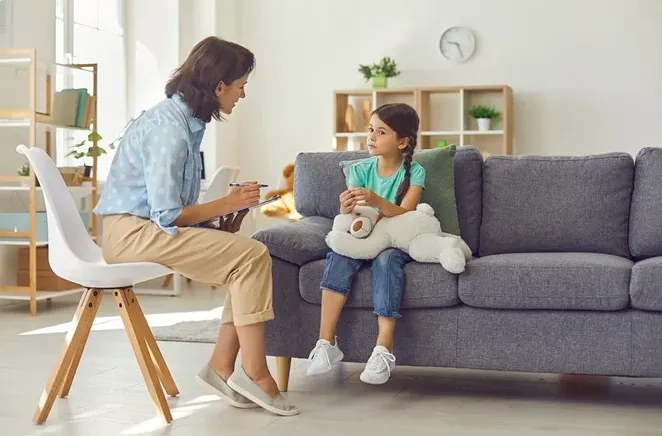Child and adolescent counseling is a specialized field of mental health that focuses on addressing the unique emotional, social, and psychological needs of children and teenagers. This stage of life is crucial for development, and counseling can play a vital role in promoting healthy growth, overcoming challenges, and fostering resilience.
Improving Lives Counseling Services provides comprehensive child and adolescent counseling to help them grow up as responsible adults to lead healthy and happy lives. Let’s explore the importance of child and adolescent counseling and how it can help parents shape their child’s future.
What are the types of child and adolescent counseling?
Child and adolescent counseling can be provided in the following ways:
- Individual Counseling: One-on-one sessions addressing specific concerns.
- Family Therapy: Involving family members to improve communication and relationships.
- Group Therapy: Social skills development and support groups.
- Play Therapy: Using play to explore emotions and behaviors (ages 3-12).
- Cognitive-Behavioral Therapy (CBT): Identifying and changing negative thought patterns.
- Dialectical Behavior Therapy (DBT): Developing emotional regulation skills.
Why is the importance of child and adolescent counseling?
Child and adolescent counseling is crucial for promoting healthy development, addressing mental health concerns, and fostering resilience in young individuals. The importance of child and adolescent counseling can be understood from the following perspectives:
Prevention and Early Intervention
- Identifies and addresses mental health issues before they escalate
- Prevents long-term consequences (e.g., substance abuse, chronic mental health conditions)
- Enhances emotional regulation and coping skills
Supports Healthy Development
- Promotes social skills development and relationships
- Fosters self-esteem, confidence, and identity formation
- Enhances academic performance and motivation
Addresses Mental Health Concerns
- Anxiety, depression, trauma, and other mental health conditions
- Suicidal ideation and self-harm prevention
- Coping with adversity (e.g., bullying, divorce, loss)
Family and Community Benefits
- Improves parent-child relationships and communication
- Enhances family dynamics and conflict resolution
- Supports teachers and educators in addressing student needs
Long-Term Benefits
- Increased resilience and adaptability
- Better mental health outcomes in adulthood
- Improved overall well-being and life satisfaction
What is the role of parents, guardians, and caregivers?
Parents, guardians, and caregivers play a vital role in supporting the mental health and well-being of children and adolescents. Their involvement is crucial for effective counseling outcomes.
Responsibilities
- Encourage open communication
- Support counseling process
- Model healthy emotional regulation
- Foster positive relationships
- Monitor progress and adjust strategies
Ways to support counseling
- Attend family therapy sessions
- Collaborate with counselors and healthcare providers
- Reinforce coping skills and strategies
- Provide emotional support and validation
- Maintain consistency and routine
Benefits of Involvement
- Improved treatment outcomes
- Enhanced parent-child relationships
- Increased understanding of child’s needs
- Better communication and conflict resolution
- Support for the entire family
Tips for Effective Involvement
- Stay informed about the counseling process
- Ask questions and seek clarification
- Respect child’s boundaries and confidentiality
- Foster positive attitudes toward counseling
- Prioritize self-care and seek support
What are the future directions in child and adolescent counseling?
The field of child and adolescent counseling is continually evolving, with emerging trends, research, and technologies shaping its future. Some potential future directions include:
- Integrative therapies (e.g., mindfulness, yoga)
- Animal-assisted therapy
- Virtual reality exposure therapy
- Brain-computer interface (BCI) therapy
- Online counseling platforms
- Mobile mental health apps
- Artificial intelligence (AI) powered chatbots
- Telepsychology and virtual reality therapy
- Culturally sensitive assessment and treatment
- Addressing systemic injustices and trauma
- Increasing diversity in the counseling workforce
- Incorporating diverse family structures and relationships
- Neuroimaging and neurofeedback
- Understanding neurodevelopmental disorders
- Early intervention and prevention
- Integrating neuroscience into counseling practice
- School-based mental health services
- Community-based prevention programs
- Collaborations with healthcare providers
- Parent-teacher-counselor partnerships
- Outcome-based research
- Randomized controlled trials (RCTs)
- Systematic reviews and meta-analyses
- Dissemination and implementation science
Child and adolescent counseling is a vital component of promoting healthy development and addressing mental health concerns. By understanding the importance, types, and benefits of counseling, parents, caregivers, and mental health professionals can work together to support the well-being of children and adolescents.
